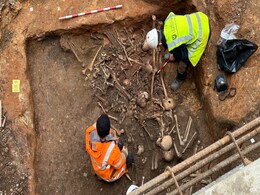Radiocarbon Dating
- All
- News
-

11,000-Year-Old Settlement in Canada Challenges Indigenous History
- Monday February 10, 2025
- Written by Gadgets 360 Staff
An 11,000-year-old settlement, Âsowanânihk, discovered in Saskatchewan, is reshaping perspectives on early Indigenous civilizations in North America. Located in Sturgeon Lake First Nation territory, the site contains stone tools, firepits, and bison remains, indicating long-term habitation rather than temporary hunting camps. According to researc...
-
 www.gadgets360.com
www.gadgets360.com
-

The Truth About Century-Old Skull, Believed To Be Of Cleopatra's Half-Sister
- Sunday January 12, 2025
- World News | Edited by NDTV News Desk
A mystery dating back nearly a century about a skull believed to belong to Cleopatra's murdered half-sister has been solved using modern DNA analysis and radiocarbon dating.
-
 www.ndtv.com
www.ndtv.com
-

When Did Humans And Dogs Become Friends, Study Says Much Before Than Previously Thought
- Saturday December 7, 2024
- Science | Edited by Abhinav Singh
Radiocarbon dating revealed that the dog was alive about 12,000 years and showed signs of being in close contact with humans.
-
 www.ndtv.com
www.ndtv.com
-

Mysterious 4,000-Year-Old Fishing Canals Unearthed In Belize
- Saturday November 30, 2024
- Science | Edited by Nikhil Pandey
The research used 26 radiocarbon dates from test excavation sites in the Crooked Tree Wildlife Sanctuary (CTWS) the largest inland wetland in Belize.
-
 www.ndtv.com
www.ndtv.com
-

Saber-Toothed Kitten Preserved for 37,000 Years Found in Siberian Ice
- Tuesday November 19, 2024
- Written by Gadgets 360 Staff
A saber-toothed kitten, frozen in Siberian permafrost for 37,000 years, has provided an unprecedented look at the extinct predator Homotherium latidens. Unearthed near the Arctic Circle, the well-preserved cub retains soft brown fur, intact whiskers, sharp claws, and footpads, offering unique insights into its anatomy. Radiocarbon dating revealed t...
-
 www.gadgets360.com
www.gadgets360.com
-

123 Bodies Found in England's Ancient Leicester Cathedral: What You Need to Know
- Tuesday November 19, 2024
- Written by Gadgets 360 Staff
In Leicester, archaeologists uncovered a mass burial pit containing 123 bodies, dating back to the early 12th century. The cause of death remains unclear, though theories point to famine or pestilence. Radiocarbon dating revealed the bodies predated the Black Death, further deepening the mystery. The find offers a glimpse into medieval life and dea...
-
 www.gadgets360.com
www.gadgets360.com
-

Skeleton in Found Belgium Contains Bones from Five People Across 2,500 Years of History
- Wednesday November 6, 2024
- Written by Gadgets 360 Staff
A skeleton found in Pommerœul, Belgium, shocked archaeologists when they discovered that it contained bones from at least five people, spanning from the Neolithic era to the Roman period. The bones were carefully arranged, possibly by the Romans who may have disturbed a Neolithic grave. DNA analysis and radiocarbon dating have confirmed the bones...
-
 www.gadgets360.com
www.gadgets360.com
-

Scientists Find Evidence of Past Extreme Solar Storms, Warn of Potential Technological Catastrophe
- Wednesday September 25, 2024
- Written by Gadgets 360 Staff
Scientists have uncovered evidence of past solar storms that were far more extreme than the well-known Carrington event of 1859, which disrupted telegraph systems across Europe and North America. By studying radiocarbon levels in tree rings, researchers like Fusa Miyake have identified ancient solar events, including a massive storm in AD774 that d...
-
 www.gadgets360.com
www.gadgets360.com
-

What 'Virtual Autopsy' Revealed About Health Of A 17th Century Mummified Baby
- Wednesday October 26, 2022
- World News | Edited by Nikhil Pandey
Researchers from Germany conducted a "virtual autopsy" on a baby who had been mummified and buried in an Austrian mausoleum.
-
 www.ndtv.com
www.ndtv.com
-

Scientists Didn't Discover A 512-Year-Old Shark, Probably
- Saturday December 16, 2017
- World News | Avi Selk, The Washington Post
Mother Nature is capable of some incredible things, but we have to credit humanity with the dubious feat of aging a shark 240 years in just 16 months.
-
 www.ndtv.com
www.ndtv.com
-

11,000-Year-Old Settlement in Canada Challenges Indigenous History
- Monday February 10, 2025
- Written by Gadgets 360 Staff
An 11,000-year-old settlement, Âsowanânihk, discovered in Saskatchewan, is reshaping perspectives on early Indigenous civilizations in North America. Located in Sturgeon Lake First Nation territory, the site contains stone tools, firepits, and bison remains, indicating long-term habitation rather than temporary hunting camps. According to researc...
-
 www.gadgets360.com
www.gadgets360.com
-

The Truth About Century-Old Skull, Believed To Be Of Cleopatra's Half-Sister
- Sunday January 12, 2025
- World News | Edited by NDTV News Desk
A mystery dating back nearly a century about a skull believed to belong to Cleopatra's murdered half-sister has been solved using modern DNA analysis and radiocarbon dating.
-
 www.ndtv.com
www.ndtv.com
-

When Did Humans And Dogs Become Friends, Study Says Much Before Than Previously Thought
- Saturday December 7, 2024
- Science | Edited by Abhinav Singh
Radiocarbon dating revealed that the dog was alive about 12,000 years and showed signs of being in close contact with humans.
-
 www.ndtv.com
www.ndtv.com
-

Mysterious 4,000-Year-Old Fishing Canals Unearthed In Belize
- Saturday November 30, 2024
- Science | Edited by Nikhil Pandey
The research used 26 radiocarbon dates from test excavation sites in the Crooked Tree Wildlife Sanctuary (CTWS) the largest inland wetland in Belize.
-
 www.ndtv.com
www.ndtv.com
-

Saber-Toothed Kitten Preserved for 37,000 Years Found in Siberian Ice
- Tuesday November 19, 2024
- Written by Gadgets 360 Staff
A saber-toothed kitten, frozen in Siberian permafrost for 37,000 years, has provided an unprecedented look at the extinct predator Homotherium latidens. Unearthed near the Arctic Circle, the well-preserved cub retains soft brown fur, intact whiskers, sharp claws, and footpads, offering unique insights into its anatomy. Radiocarbon dating revealed t...
-
 www.gadgets360.com
www.gadgets360.com
-

123 Bodies Found in England's Ancient Leicester Cathedral: What You Need to Know
- Tuesday November 19, 2024
- Written by Gadgets 360 Staff
In Leicester, archaeologists uncovered a mass burial pit containing 123 bodies, dating back to the early 12th century. The cause of death remains unclear, though theories point to famine or pestilence. Radiocarbon dating revealed the bodies predated the Black Death, further deepening the mystery. The find offers a glimpse into medieval life and dea...
-
 www.gadgets360.com
www.gadgets360.com
-

Skeleton in Found Belgium Contains Bones from Five People Across 2,500 Years of History
- Wednesday November 6, 2024
- Written by Gadgets 360 Staff
A skeleton found in Pommerœul, Belgium, shocked archaeologists when they discovered that it contained bones from at least five people, spanning from the Neolithic era to the Roman period. The bones were carefully arranged, possibly by the Romans who may have disturbed a Neolithic grave. DNA analysis and radiocarbon dating have confirmed the bones...
-
 www.gadgets360.com
www.gadgets360.com
-

Scientists Find Evidence of Past Extreme Solar Storms, Warn of Potential Technological Catastrophe
- Wednesday September 25, 2024
- Written by Gadgets 360 Staff
Scientists have uncovered evidence of past solar storms that were far more extreme than the well-known Carrington event of 1859, which disrupted telegraph systems across Europe and North America. By studying radiocarbon levels in tree rings, researchers like Fusa Miyake have identified ancient solar events, including a massive storm in AD774 that d...
-
 www.gadgets360.com
www.gadgets360.com
-

What 'Virtual Autopsy' Revealed About Health Of A 17th Century Mummified Baby
- Wednesday October 26, 2022
- World News | Edited by Nikhil Pandey
Researchers from Germany conducted a "virtual autopsy" on a baby who had been mummified and buried in an Austrian mausoleum.
-
 www.ndtv.com
www.ndtv.com
-

Scientists Didn't Discover A 512-Year-Old Shark, Probably
- Saturday December 16, 2017
- World News | Avi Selk, The Washington Post
Mother Nature is capable of some incredible things, but we have to credit humanity with the dubious feat of aging a shark 240 years in just 16 months.
-
 www.ndtv.com
www.ndtv.com











